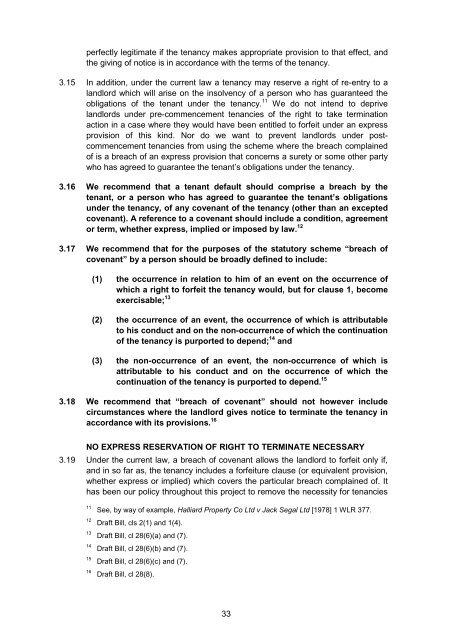Termination of Tenancies for Tenant Default - Law Commission
Termination of Tenancies for Tenant Default - Law Commission
Termination of Tenancies for Tenant Default - Law Commission
Create successful ePaper yourself
Turn your PDF publications into a flip-book with our unique Google optimized e-Paper software.
perfectly legitimate if the tenancy makes appropriate provision to that effect, and<br />
the giving <strong>of</strong> notice is in accordance with the terms <strong>of</strong> the tenancy.<br />
3.15 In addition, under the current law a tenancy may reserve a right <strong>of</strong> re-entry to a<br />
landlord which will arise on the insolvency <strong>of</strong> a person who has guaranteed the<br />
obligations <strong>of</strong> the tenant under the tenancy. 11 We do not intend to deprive<br />
landlords under pre-commencement tenancies <strong>of</strong> the right to take termination<br />
action in a case where they would have been entitled to <strong>for</strong>feit under an express<br />
provision <strong>of</strong> this kind. Nor do we want to prevent landlords under postcommencement<br />
tenancies from using the scheme where the breach complained<br />
<strong>of</strong> is a breach <strong>of</strong> an express provision that concerns a surety or some other party<br />
who has agreed to guarantee the tenant’s obligations under the tenancy.<br />
3.16 We recommend that a tenant default should comprise a breach by the<br />
tenant, or a person who has agreed to guarantee the tenant’s obligations<br />
under the tenancy, <strong>of</strong> any covenant <strong>of</strong> the tenancy (other than an excepted<br />
covenant). A reference to a covenant should include a condition, agreement<br />
or term, whether express, implied or imposed by law. 12<br />
3.17 We recommend that <strong>for</strong> the purposes <strong>of</strong> the statutory scheme “breach <strong>of</strong><br />
covenant” by a person should be broadly defined to include:<br />
(1) the occurrence in relation to him <strong>of</strong> an event on the occurrence <strong>of</strong><br />
which a right to <strong>for</strong>feit the tenancy would, but <strong>for</strong> clause 1, become<br />
exercisable; 13<br />
(2) the occurrence <strong>of</strong> an event, the occurrence <strong>of</strong> which is attributable<br />
to his conduct and on the non-occurrence <strong>of</strong> which the continuation<br />
<strong>of</strong> the tenancy is purported to depend; 14 and<br />
(3) the non-occurrence <strong>of</strong> an event, the non-occurrence <strong>of</strong> which is<br />
attributable to his conduct and on the occurrence <strong>of</strong> which the<br />
continuation <strong>of</strong> the tenancy is purported to depend. 15<br />
3.18 We recommend that “breach <strong>of</strong> covenant” should not however include<br />
circumstances where the landlord gives notice to terminate the tenancy in<br />
accordance with its provisions. 16<br />
NO EXPRESS RESERVATION OF RIGHT TO TERMINATE NECESSARY<br />
3.19 Under the current law, a breach <strong>of</strong> covenant allows the landlord to <strong>for</strong>feit only if,<br />
and in so far as, the tenancy includes a <strong>for</strong>feiture clause (or equivalent provision,<br />
whether express or implied) which covers the particular breach complained <strong>of</strong>. It<br />
has been our policy throughout this project to remove the necessity <strong>for</strong> tenancies<br />
11 See, by way <strong>of</strong> example, Halliard Property Co Ltd v Jack Segal Ltd [1978] 1 WLR 377.<br />
12 Draft Bill, cls 2(1) and 1(4).<br />
13 Draft Bill, cl 28(6)(a) and (7).<br />
14 Draft Bill, cl 28(6)(b) and (7).<br />
15 Draft Bill, cl 28(6)(c) and (7).<br />
16 Draft Bill, cl 28(8).<br />
33

















